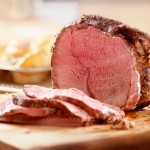We've been buying meat (a bison we split four ways, a young sheep we shared with another couple and, most recent a quarter beef) that's been grass-fed and grass-finished. I always thought it was a healthier way to eat red meat, even though overall we're eating smaller meat portions, more fish and chicken, lots more fruit and veggies all the time and an occasional meat-free main meal.
Now I found a very well done (no pun intended) examination of the issue at the CNN.com website. CNN discussed the Cooking Light Test Kitchen. We have a subscription to that magazine and enjoy its recipes, but I didn't know much about its test kitchen. They had a complete article on the grass-finished vs. grain finished beef controversy. I say grass-finished since essentially all cows eat grass to start with, but some eat only grass and perhaps some hay for six months to a year. Others, those who end up in those huge feedlots like the ones we see when we drive east in Colorado, eat corn mixed with soy and other edibles and are given hormones and lots of antibiotics, whether they are ill or not.
I won't even get into the subject of drug-resistent bacteria in this post, but instead I'll stick to the question of "Can a grass-finished ruminant taste good and can I afford to buy grass-finished beef?" I should mention bison as well, but that meat wasn't tested in CNN's study.
In short, the answer is going to be yes for almost all of us. I know the meat will be less fatty (there's always going to be some fat, of course), but cooked properly, anyone other than those who are specially "trained to evaluate sensory characteristics in beef" won't know the difference. I have a friend who raised beef cattle in Nebraska and disagrees with me on the subject, but the Nutrition Journal article I just quoted (I printed the entire journal article that was mentioned in passing in the CNN piece), basically said it's what you grew up eating. Consumer "sensory panels", that represent the vast majority of us, they felt, were more of an art than a science.
So what are the advanatges and disadvantages of grass-finished beef. It's got fewer calories, roughly four and a half pounds worth per year if you eat as much beef as the average American. Its fat is yellower than the grass-finished cow's, representing more beta-carotene, a significant antioxidant. And it contains more omega-3s as well as more Vitamin A & E.
Disadvantages? It may cost more, if you buy it at the supermarket, but try your area's CSA or look for a local farmer who raises beef and buy it in bulk. CNN got 243 pounds of meat for $5.32 per pound, just a tad higher than they would have paid in supermarkets. We paid <$3 per pound for the quarter cow we bought recently. I'll finish the Chico State article + one from Tufts in another post.

